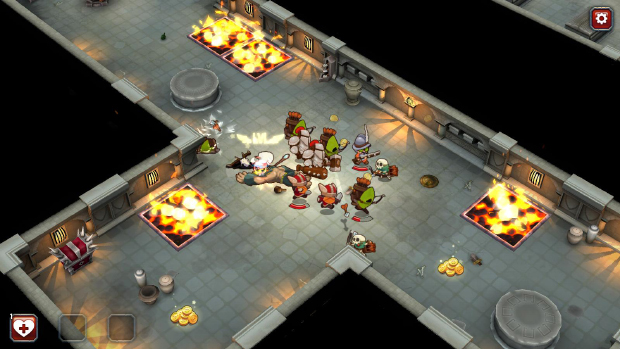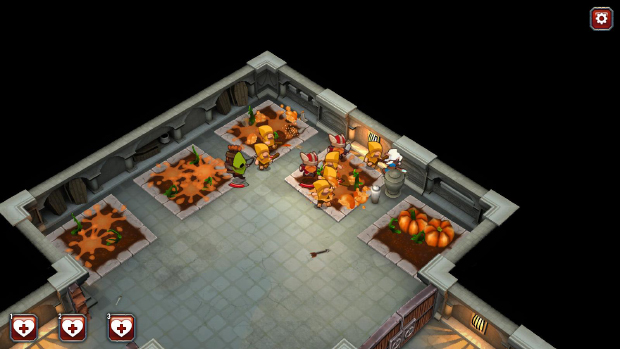Premature Evaluation: Super Dungeon Run
Power in Numbers
Each week Marsh Davies picks up his cudgel and pelts into the dank depths of Early Access, thrashing wildly, returning with any stories he can find, if he returns at all. This week he’s been playing Super Dungeon Run, a chirpy top-down brawler that combines Diablo’s procedurally organised goblin grinding with Pikmin-ish mob control.
Peasants just love gold. They are willing to throw their lives away for it, bundling into dungeons full of whirring sawblades and spiketraps, diving headlong into ogres and goat-headed necromancers as though they were skittles. I empathise to some extent. I too like gold. But I like gold because of all the other nice things gold can buy me. In Super Dungeon Run, gold buys you the means to acquire more gold, and it’s a feedback loop I fundamentally don’t really get, which is why I will never be asked to work for Goldman Sachs. In games, just as in high finance it seems, we sometimes allow the numbers themselves to become our masters. What surely started out as a way of abstractly representing actual progress - making numbers go up - is now seen as progress in itself. However, unlike in some of the other more naked number traps, like Clicker Heroes, Super Dungeon Run appends a game to the grind, and it’s a rather jolly one - albeit, at this stage of development, a lot slighter on tactical participation than a lot of other dungeon crawlers.
You control not one hero, but several, simultaneously. There's no micromanagement here, though: holding down your mouse button directs your entire mob of peasants to bundle towards that single point. They have some autonomy - individuals will break rank to swipe loot or set upon enemies, but sustained long clicks will drag them back into a central throng. Corralling your troops is an unusual and appealing exercise in fluid dynamics, dragging the jiggling mass down corridors, cascading over obstacles, coalescing on you cursor-point as you shimmy them between lethal hazards. Sometimes your numbers are such that it's quite a squeeze - you may need to press your army into a wall, shaping their formation into a column before threading it between spike-traps or explosives. It has some momentum too, and, as you weave out of the way of flamethrowers and cannonfire, it’s easy to overcommit to a direction and have your numbers trimmed by a saw-blade.
This dexterity challenge is really the core of the game - the one way in which the skill of the player is expressed. Although you fight monsters too, there’s a limit to the tactical expression currently possible in the game. Your mob starts as mere peasantry but, as you unlock classes through grind, your loot-hoovering serfs upgrade themselves by pulling the newly-available class-costumes from treasure chests. You don’t get a say over which you get, or have a right of refusal, and you have no individualised control over the units either - you can’t drag-select a portion of your troops and control only them: everyone moves as a single pack, swamping enemies as a mob. That said, some minor AI variance means range units tend to hang back a bit of their own volition, while melee units launch themselves in - but you are given no direct control over this. You can try and tempt the aggression of individual enemies before kiting them away from their pack, and you can choose to focus your mob on particular threats with insistent clicking - but these are the only positional tools at your disposal to massage the odds in your troops’ favour.
You’re given a smidgen of additional agency in deciding when to slug potions. These provide all your troops with a boost to health, damage, speed or endurance. Using them at the right moment is important, but, again, it is a relatively slight means of exerting your influence over the battle. However, the devs say that special class-specific hotkey attacks are in the pipeline. I’m not sure how these will fit within a game where there is so little direct control over individual units - but I welcome anything which gives me just a bit more sense of tactical choice, to allow one battle to feel distinct from another.
This said, combat certainly isn’t without its pleasures at the moment - there is a base level of satisfaction in watching your peasants flood over enemies, cudgels flailing. But, right now, the game doesn’t have quite enough variety to make this enduringly interesting. There are currently very few flavours of dungeon, and the procedural generation isn’t especially granular, meaning that after an hour or two, you are very familiar with each room type you encounter, even if the order of them is different. You can choose between an endless dungeon dive or specific quests, which slowly become available as you grind levels, each offering a bespoke challenge - but you quickly become familiar with these, too. More are planned and hopefully these will begin to offer more profound mechanical variety outside of that which you can experience in the vanilla dungeoneering.
The incentive for progress at this stage seems to be primarily to make numbers go up, so you can unlock and purchase stuff that helps the numbers go up. Without the ability to directly control a sniper’s shot, or even to choose to have a sniper among your ranks, the pleasure of upgrading his damage is lost among other background stats. You might put it down to my borderline innumeracy, but I just don’t find the pull of the Numberwang to be very strong. I see numbers going up as a useful way of abstracting learning that commutes some other kind of tangible benefit. I don’t care about levels, for instance: I care about the new skills I receive that change the way I play the game. But the experience here is extremely flat from one level to the next. New units unlock - warriors, archers, sorceresses, knights, snipers and grenadiers - but the lack of individualised control means your style of play is rarely radically altered. Only if the number generator spits out an army comprised solely of sorceresses, say, does this force a rethink of how you behave.
New potions unlock, too, but it actually seems a mistake to purchase them for use. Once bought, they become available as a random drop from chests - but only the health potion gives you a permanent benefit. Strength potions are a buff that lasts only a handful of moments, and while this certainly incites the player to think more about timing than at any other point of the game, it’s also way, way less useful than healing your troops. Since you only have three slots at any time, buying strength or endurance potions is only going to dilute the availability of a much more important resource, and, given that each class has its own spread of strength/endurance/speed-boosting items to laboriously unlock, craft and then purchase, these potions also feel a little redundant.
I’m interested to see where Super Dungeon Run goes. With the mob-movement the devs have found a core dexterity challenge which turns dungeoneering into an unusually tactile pleasure, but, for my personal taste, they will need to parlay that into a game which can sustain interest by evolving mechanically across its many grindsome hours. I don’t think mere variety is the sole solution - the unlocking of classes, kit and potions needs to change the way you think about encounters, and give you more options within them. Otherwise its just numbers going up in the background, gold for gold’s sake - and I like to flatter myself that I have more sophisticated impulses than peasants and bankers both.
Super Dungeon Run is available from Steam for £4 and it’s already some splashy fun for a brief period, with prospects to become something more enduringly interesting as it develops. I played the version with the Build ID 694326 on 22/07/2015.





